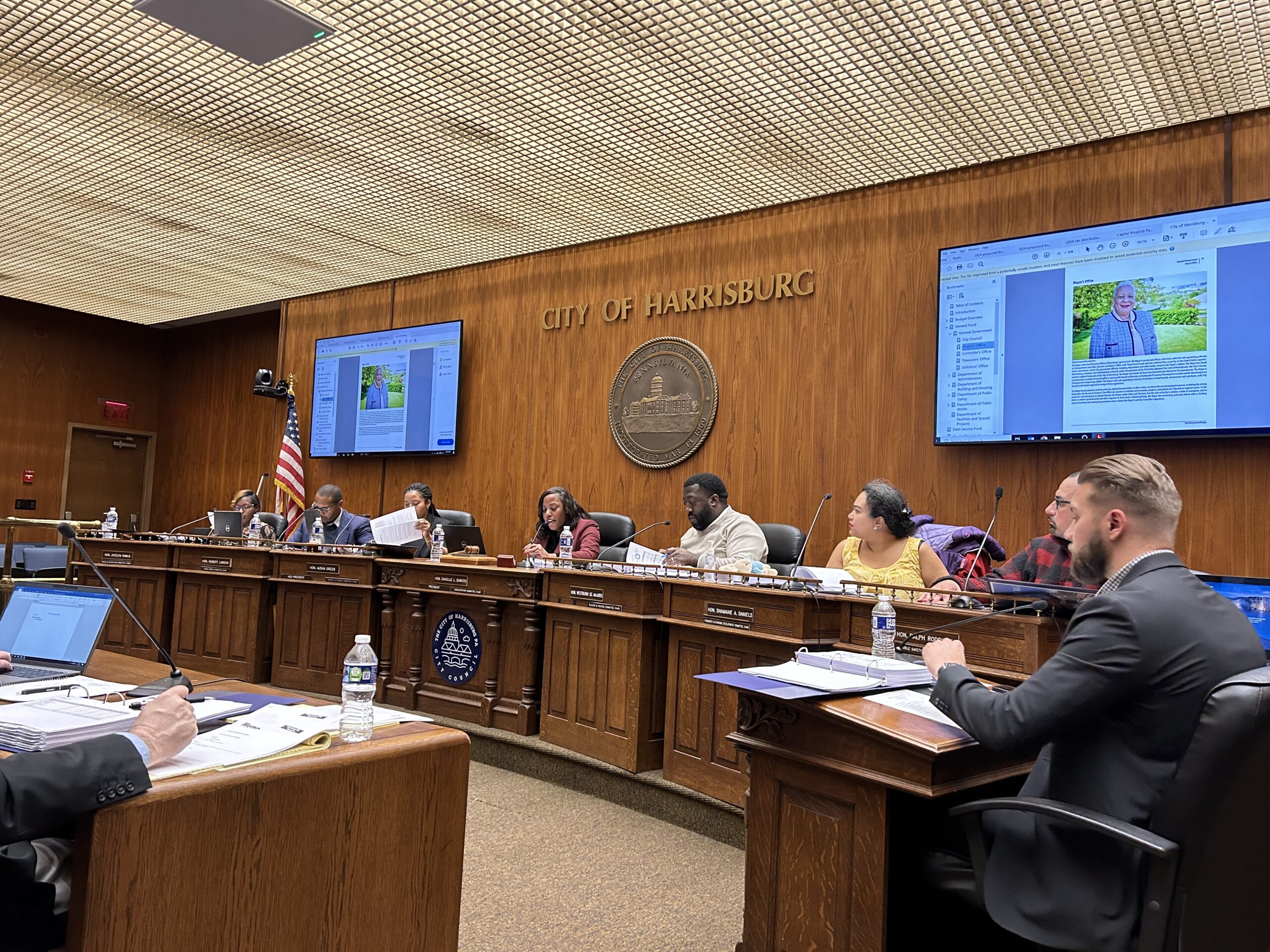Harrisburg has solidified a spending plan for the new year, one that anticipates impacts from inflation and the lingering effects of the pandemic.
On Thursday, City Council approved a $109.4 million general fund budget for 2024, which includes investments in infrastructure and public safety.
The budget does not include a property tax increase.
In total, the balanced budget equals $150.7 million, including the general fund budget and the $21.1 million neighborhood services fund budget, among others.
The budget, first proposed by Mayor Wanda Williams in November, specifically prioritizes projects such as street paving, upgrades to city parks and the hiring of several new police officers. The plan also factors in the spending of federal American Rescue Plan Act (ARPA) money on projects like renovating the Hall Manor pool and funding affordable housing development, one-time funds that boosted this year’s budget number.
Council passed the budget after making a few minor amendments, mostly reducing raises for city employees that they felt were not deserved or adequately explained by the administration. The budget was slated to be approved on Tuesday, but was recessed for further discussion and approval on Thursday. Council voted 5-1 to approve the budget, with council member Shamaine Daniels voting against it. Council member Jocelyn Rawls was not present.
Additionally, in 2024 the city will raise residents’ monthly trash bills by $3.23, making the cost $35.57 per month.
According to city Business Administrator Dan Hartman, the fee hike is needed to offset inflation and continuously increasing expenses such as tipping fees, wage increases, vehicle costs and fuel prices.
Hartman defended the city’s decision to raise rates on Monday after Treasurer Dan Miller held a press conference that morning to state his opposition to the plan. Ultimately, council approved the measure.
“This is something that, while no one wants to have to do it, I think it is responsible to ensure that our neighborhood services fund can continue to operate from a strong position moving forward,” council member Westburn Majors said.
And while Harrisburg’s budget is impacted by rising costs, it is also affected by areas of decreased revenue, so that the city will have to “tighten its belt” in the 2024 budget, Hartman explained during a separate interview with TheBurg.
Several of the city’s sources of income have struggled to recover post-COVID, including revenue from parking, property taxes and business privilege taxes, affecting its 2024 general fund budget.
“You’re dealing with, what does the new economy look like, and how does the city balance what is the old way of taxing through what is kind of our new economy?” Hartman said.
During the pandemic, Harrisburg saw big decreases in cash flow from parking and taxes from businesses as foot traffic slowed and some shops even closed down. In the wake of COVID, the city is still experiencing losses, as people continue to telework, bringing fewer people into Harrisburg to park, shop and dine.
Harrisburg receives revenue from parking from two buckets, both of which have come up drier than usual.
In 2013, Harrisburg signed a long-term lease of its parking assets. Under the lease, the city gets money from taxes on parking. Before the pandemic, in 2019, Harrisburg brought in about $4.2 million from that bucket of funds. In 2020, that number dropped to about $3.4 million and now, as part of its 2024 budget, city officials project about $3.7 million in revenue, a figure that still hasn’t recovered to pre-pandemic levels.
Additionally, the city historically has received a few million dollars a year in “waterfall payments” from parking–a small share of the parking system’s overall revenue–but those payments dropped off during COVID. The city currently receives nothing from that stream of revenue, Hartman said.
Hartman attributes the loss in parking revenue to the effects of the pandemic, specifically as fewer people have swapped in-office work for telework.
Additionally, property tax assessment appeals have become the city’s latest financial headache, as office building owners, also impacted by COVID and work-from-home, attempt to lower their properties’ market values, thus lessening the tax revenue received by the city, county and school district.
“All of this loops around and has a direct effect on our bottom line,” Hartman explained.
The city projects a loss of several hundred thousand dollars in taxes from these properties due to reassessments.
“You can walk outside our building, look in any direction, and you’ll be seeing someone [who has appealed their assessment],” Hartman said.
Even considering the revenue losses, the 2024 budget is balanced.
One area of increased revenue for the city is earned income taxes (EIT), which, over the past several years, has jumped. Due to factors like wage increases, inflation and people getting additional jobs, the EIT the city receives has gone from around $10 million five years ago to around $17 million this past year. The 2024 budget anticipates another $1 million increase.
“That growth has exploded,” Hartman said. “That wage growth has done so much to offset drops elsewhere. But keep in mind, our costs go up every year.”
However, the city will need to figure out how to handle the long-term effects of telework.
Hartman said that Harrisburg has goals to draw businesses into the city and create more housing to boost the city’s tax base.
“That’s how you build your fix, is taking underutilized, underdeveloped areas and redeveloping them,” he said.
In other news, council approved the appointment of Rafiyqa Muhammad, Katherine Scott and Pamela Parson to the Environmental Advisory Council.
Council also appointed Quinton Davis, Adrian Selkowitz, Gia Johnson and Lakichia Carrier to the Citizen’s Law Enforcement Advisory Committee. The new committee was created by council in 2020, but its nine seats were never filled.
Thursday marked council’s final meeting of the year. Council meetings will resume in January.
If you like what we do, please support our work. Become a Friend of TheBurg!






